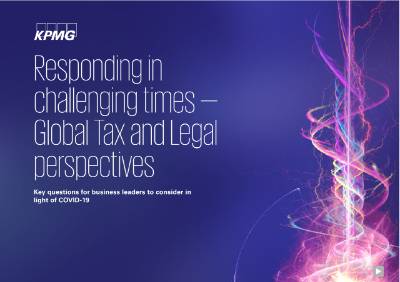The spread of the Novel Coronavirus (COVID-19) is causing severe disruption to society and to businesses globally. Across the KPMG Global Tax & Legal Network, our leaders have convened to put forward the following tax and legal considerations for affected businesses. This is not an exhaustive list and should not be acted upon without independent advice based on your unique facts and circumstances, but it can be a helpful starting point for thinking through your situation.

During this time, it is possible that employees will need to work in a country that is not their usual place of work for a prolonged period of time. For example, because they are stranded by a travel ban, they are expatriates who must return to their home country during a crisis, or they are asked to move to work in a safer location.
Employee/expatriate issues
Legal considerations
- From a legal/employment perspective, do your employees have particular contractual (or potentially statutory) rights and entitlements that may be triggered by these events? For example, repatriation requirements for overseas staff or work health and safety requirements for employees not working under usual operating conditions?
- From a legal/contractual perspective are there procedures in place to allow contracts to be signed electronically? If not, will it be possible to safely deliver contracts physically to the appropriate signatories so that they can be signed and delivered on a timely basis?
Personal/employment tax considerations
- Each country has its own laws for determining when an individual is a resident for tax purposes. Double taxation agreements govern the taxation rights of particular income sources, where people are tax resident in more than one country or jurisdiction, or where countries exert competing claims to tax a particular income source. Will the employee stay long enough in the country to trigger tax residence there? If so, what are the implications in terms of personal income tax, national security type charges and local filings? Will they become taxable only on their earnings during the relevant period or on their worldwide income?
- Even if the employee does not become tax resident in the new country or jurisdiction, are there rules that would subject their employment income to local taxes during the period they work there?
- Have temporary relief restrictions been introduced that will lead to them not being taxable or that could reduce some burdensome tax compliance and filing requirements?
- What evidence will they need to collect to support their position if unable to leave a country, and do any exemptions apply? Have they gathered sufficient evidence to support their position?
- Where they do become tax resident in the new country, what are the implications in their home jurisdiction?
- What are the tax implications when they return to their usual place of work and cease to be resident in the new jurisdiction?
Permanent establishment issues for the employing company
- Will the employee create a taxable presence for the company under local law? For example, because they are treated as carrying on the business in that country or are a dependent agent? If so, consider whether relief is available under the permanent establishment article in any applicable double tax treaty.
- If a taxable presence is created, what are the local filing requirements and tax consequences?
- If a permanent establishment is created, will the company’s home jurisdiction exempt the permanent establishment profits or provide a credit for any foreign tax paid?

An individual who is a director of a group company may be a resident in one country or jurisdiction and will normally travel to another for the board meeting of the company. Travel bans may make physical attendance at board meeting impossible. Alternatively, the case may be that a director has travelled abroad and can no longer return home to attend a particular board meeting.
- If directors cannot attend meetings in person, do the relevant corporate statutes allow meetings to be held virtually? Is it necessary to have a quorum meeting physically in one place with others dialing in or can the meeting be entirely virtual?
- Is there a risk that if a director calls into a board meeting from a particular country (for example the UK), which is not where the company is resident, he or she may make the company tax resident in that jurisdiction under a central management and control type test? Consider if there is an applicable double tax treaty with an effective management tie-breaker clause, which would mitigate such risk and whether it would be important to ensure that a quorum of directors is present in a particular location (or not present in a country that would trigger a central management and control risk).

Employees are having to work from home for a continuous and protracted period in many countries. In other situations, employers have asked employees to work from alternate locations or split teams between a number of locations to reduce the risk of the disease spreading.
Legal considerations
- What are the relevant employment law issues relating to health and safety obligations and potential questions around workers’ compensation and liability in the event of accidents and injuries sustained while working from home?
- What are the possible wages and entitlement compliance challenges in monitoring staff hours and calculating accrued benefits across a potentially long-term remote workforce?
- What is the potential impact on supervision of operations and compliance with specific obligations and controls with a greater number of (or all) employees working remotely?
Personal/employment tax considerations
- Will employees be able to claim a personal tax deduction for extra expenses they have from working at home? For example, heating or telephone?
- If the employer provides extra payments, such as to cover extra expenses from home working or, in cases where transport is provided to take employees to alternative places of work, could these be taxable as fringe benefits?

For many organizations, effective cash flow management is likely to be critical during this period as revenues fall and potentially, debtors delay payments or become insolvent. It may be necessary to provide emergency funding to the most adversely affected subsidiaries in a group, and/or to repatriate cash to the center in order to service external loans or group commitments.
Funding issues
- Will it be necessary to provide emergency funding to group companies? Agility will be key. Consider whether funds should be made available through loans, existing cash pooling arrangements or equity. How will the funding be repaid once the related party becomes cash positive?
- Consider thin capitalization, transfer pricing, foreign exchange issues and withholding taxes.
- Will capital controls apply to either the injection of funding or its later repatriation?
- Will financial difficulties mean any group companies might breach loan covenants? If so, can they be renegotiated?
- Might it be necessary to pull all surplus cash back to the center? For example to service third party debt. Consider issues around distributable reserves and withholding taxes.
Cash tax management
Indirect tax considerations
- Is it possible to accelerate refunds of value added tax (VAT) or goods and services tax (GST)?
- Is it possible to delay filing of VAT/GST returns, or to utilize an extended period for making any payments to the tax authorities (noting that many countries have introduced extended time limits for filing and/or payment in response to the crisis)?
- Will reduced turnover cause your business in a country to cease needing to be registered?
- Can you shift to less frequent filing periods in tax payable situations, or more frequent filing periods in tax refund situations?
- Is it possible to alter the normal timing of invoices so as to mitigate any adverse cash flow impact of VAT/GST, in terms of having to account for VAT/GST in advance of payment?
- Can input tax credits be claimed in advance of making payment? Do you need to obtain a tax invoice in advance of making payment to facilitate a credit claim?
- Is it necessary for VAT/GST to be accounted for in relation to the cancellation of supplies, ‘no-shows’ and other similar events? These outcomes can be contentious in many jurisdictions.
- Do refunds that you receive arising from the cancellations of events require an adjustment to your previous output tax?
- Consider whether VAT/GST needs to be accounted for in relation to the payment of penalties or liquidated damages where contracts cannot be fulfilled?
- Do you need to account for output tax on any government subsidy payments?
- Are there possibilities to postpone or obtain relief for other indirect taxes (property taxes, business rates, green taxes)?
- Have you considered the VAT/GST implications of the write-down or scrapping of stock?
Direct tax considerations
- Are there possibilities to postpone payment of corporation tax or instalments or advance payments of such tax (noting that some countries have announced that such measures are being introduced)?
- Is it possible or will it be necessary to claim a write down of stock or an impairment to particular investments?
- What are the rules on the carry forward or back of losses? Are there any possibilities to claim tax repayments?
- Are all relevant exemptions and credits being used? For example, for research and development.
Bad debts
- Is it possible to obtain a tax deduction for any bad debts and are there particular rules which apply to intra‑group bad debts? In regards to related party debts, is there a risk that a write off creates taxable income in the hands of the debtor or of the debt being re-characterized as equity where the related party is insolvent?
- If VAT or GST is charged on the supply, is it recoverable if the debt goes bad and, if so, how quickly?

In the current environment, supply chains may be disrupted for many reasons. Suppliers or vendors (whether group companies or independent) may lackstaff due to illness or lockdowns; transport may be disrupted; import/export bans may apply and/or cross border controls and additional inspection may be required; and insolvencies may occur. Companies may need to switch suppliers or selling channels; they may need to change the quantity or type of products and service which are bought or sold, or modify transport routes.
Legal considerations
- Could there be unexpected or unintended consequences of supply chain reorganization strategies?
- Could trans-shipment of goods through third countries to avoid ‘bottlenecks’ break the chain of control necessary to claim existing preferential benefits at the border. Could this potentially be perceived as circumvention of trade measures applying to goods from the original country of supply?
- Might the establishment of new supply arrangements expose importers to additional liabilities due to trade measures applicable to specific goods/suppliers?
- What are the challenges associated with implementing sufficient supplier due diligence from a supply chain compliance perspective? Consider, in particular, modern slavery, anti-bribery and corruption anti-money laundering compliance measures.
- What will the impact of force majeure clauses be on any claim for non-performance or claims on an insurance policy?
Indirect tax considerations
- If any changes have to be made in regards to the source of supplies, the location of exports, or transport routes across borders, what are the indirect tax consequences (VAT, GST, customs duties)?
- Do you have import reliefs in place? Can you utilize a free trade zone or similar in that country?
Direct tax considerations
- What is the impact on the group’s transfer pricing policy if profitability changes due to supply shocks and new prices for inputs, and/or changed demand and pricing on outputs?
- If changes need to be made to the supply chain, which entity bears the costs associated with these changes? Or, similarly, what if any of the DEMPE functions need to be moved to a new jurisdiction?
- Will any changes have an impact on Advance Pricing Agreements?
- Which entity or entities have to take the cost of any shut down of production, and are the costs tax deductible?

With staff working from home and business leaders focusing on the survival of the business, organizations may struggle during this time to maintain strong daily oversight of compliance processes and, as a result, deadlines may be missed.
Legal considerations
- Consider the fulfilment of corporate obligations (particularly continuous disclosure obligations for public companies) during transitional periods — e.g. large scale office closures or ‘split team’ operating environments. Disruption in normal operating conditions and team structures will pose unique challenges for directors and equivalent executive level staff to effectively comply with statutory duties and obligations. Regulatory regimes applicable to specific industries (e.g. Financial Services) will require particular strategies to be put in place to enable appropriate oversight and supervision.
- How will you maintain company secretarial and general governance obligations in a partially or wholly remote working environment?
- How will you maintain regulatory compliance across the value chain — for example, maintain visibility over anti-money laundering, trading supervision, privacy and data regulations, etc.?
Tax considerations
- How are you keeping up to date with new COVID-19 related reliefs which governments are granting?
- Have you addressed the impact of VAT/GST on contractual variations, changes to payment terms or orders, terminations and other similar events?
- Are you able to keep up to date with all the filings which are required, and have relevant countries given extended time periods?
- Do you need to file hard copies of documents? For example, for stamp duty type purposes or in countries that do not have e-filing for corporate income tax. Will this be possible if either your employees are all working from home or the relevant tax office is closed?
Please note: KPMG LLP, the U.S. member firm of KPMG international, does not provide legal services. Any commentary that touches on legal issues during the session will be on general legal concepts under non-U.S. laws, and not in any way intended as advice or views on U.S. laws or those of any jurisdiction in which KPMG’s member firms do not provide legal services.






